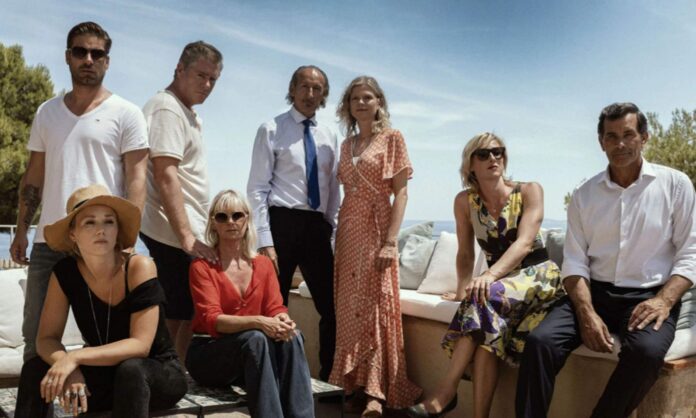You can never really outrun the past and the misdeeds therein. You may attempt to blot them out, as many do, but it catches up, one way or another. When those aforementioned misdeeds are serious crimes, they tend to hang heavily on the conscience. For all of Two Summers’ (Twee Zomers) incisive, depressing and complex subject matter, this is perhaps the biggest takeaway. The hard-hitting Belgian show pulls no punches, making the viewer experience the same level of discomfiture as the characters on screen. Each successive frame that infiltrates the friend’s group and its insidious power structures goes to show the devastating effect teenage bullying and peer pressure has on later life. At the heart of the story is sexual assault and gender, with the warped dynamics of a seemingly close set of young kids coming to a head in advanced adulthood. Two Summers is also a damning indictment of the male psyche and the sheer darkness that it comprises. When Romée (An Miller) tells her husband, Peter (Tom Vermeir) that she hears many things in his voice except remorse, it hits you, exactly where it’s intended to. Phrases such as “it’s a grey area”, “imagine what that would do to our reputations”, “it wasn’t premeditated”, “we were all high on pills and alcohol”, “we were just kids messing around”, make it clear that denial and whitewashing by a majority of men in the group is a means to assuage deep-seated guilt…an attempt to absolve one’s role – active or complicit – in a gang rape. Taking responsibility for their actions and coming to terms with the fractured past seem a bridge too far these “well meaning chaps.” A show of such a serious nature needed writing that goes beyond the norm, and Paul Baeten Gronda and Tom Lenaerts outdo themselves. The characterisation is so deft that you’re left fumbling for words. There isn’t a single person (young or old) who isn’t sketched realistically. And the boys and men aren’t reduced to caricatures, either; an essential aspect that portrays sexual crimes being committed by living, breathing human beings, not monsters who remain unrelatable. Two Summers excels at nuance. Its moral centre is on point, make no mistake (and that distinction between right and wrong is maintained at all costs), but the show doesn’t fail to exhibit the complication that lies beneath each decision the members take, good or bad.
Creators – Paul Baeten Gronda, Tom Lenaerts
Directors – Tom Lenaerts, Brecht Vanhoenacker
Cast – An Miller, Marieke Anthoni, Tom Vermeir
Streaming On – Netflix
Rating – 4/5
The inaugural season presents a parallel story of a once-tightknit group of friends. They reunite after thirty years to spend the weekend on a remote French island. In 1992, they were as thick as thieves, partying their teenage years to high glory. Over the intervening period, Romée married Peter; Sofie (Inge Paulussen) married Didier (Herwig Ilegems); Saskia (Ruth Becquart) and Luk (Kevin Janssens) are divorced, and have a son with special needs; Luk is now married to the much younger Lia (Sanne-Samina Hanssen), who’s the only one not part of the original set of friends; finally, there’s Stef (Koen De Bouw), a high-ranking Belgian Minister who is single. The awkward reunion gets off to a rocky start when Peter receives a video from a drug-filled, drunken and hazy night in 1992, a video recorded from Luk’s camcorder that indicts the boys in a heinous crime. The blackmailer threatens to leak the evidence if 100 Bitcoin isn’t transferred before the weekend comes to a close.
As you get sucked into Two Summers' concurrent narratives, the lingering sense of unease fails to leave your side. The reveal makes itself known early on, but the gradual building of tension and intrigue, as the men scramble to come to terms with their actions, sets the show apart. The dynamics within the group (dating back to the events from thirty years ago) is as complicated as the crux of the story. In 1992, Luk has just recovered from cancer. Saskia is the femme fatal, having being involved with Peter and then Luk. Though Stef is in love with her, she requests that they remain friends. Sofie and Didier become involved at some point. Peter ends up with Romée. Mark (Felix Meyer) is the resident hothead. It may all be a complex web of teenage hormones and emotions, but some lines are to never be crossed. Another thing that is striking about that time is the pattern of bullying, something that is brushed off as harmless banter. Luk, Stef and Didier are more introverted, and hence, subject to unsavoury jokes. Even after years, his Mowgli pet name from the past doesn’t sit well with Stef. Due to their extroverted personalities, Mark and Peter become de facto leaders of the boys’ group. Peer pressure is huge, and Two Summers trains a spotlight on the worst outcome of such behaviour. Even though the 1992 cast appears mostly in flashbacks and montages, they match their older counterparts in ability at every turn. It will be a real shame if the series doesn’t get picked up for subsequent seasons. Gender-sensitive, intelligent, nuanced and powerful, all at once!

#Summers #Review #dark #depressingly #brilliant #show

